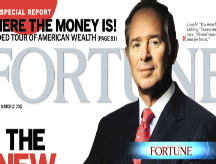How Smucker avoids a tax jam
Its labels may look down-home, but Smucker's tax games are very sophisticated.
NEW YORK (Fortune) -- It looks like a simple corporate transaction negotiated around a kitchen table. J.M. Smucker, the jelly and jam outfit, is buying the Folgers coffee business from Procter & Gamble, creating a breakfast food combo. What could be more down-home?
But when you look at the $3.3 billion transaction, announced last week, you see that it's complex and sophisticated - and that it's anything but nutritious for us taxpayers.
What I like best about this transaction is that while Smucker (SJM) affects a Midwestern naiveté - its corporate symbol is a big red strawberry and its headquarters are at 1 Strawberry Lane in Orrville, Ohio - it can play tax games with the big boys.
In fact, this is the second tax-advantaged "reverse Morris Trust" deal that Smucker is doing with P&G (PG, Fortune 500), a multinational giant based in Cincinnati that's one of the world's most sophisticated operators.
In 2002, Smucker bought Jif peanut butter from P&G, becoming a PB&J conglomerate, as it were. To help that deal slide through a variety of tax hoops, P&G also threw in its Crisco oil business. Now, with those acquisitions digested, Smucker is moving on to coffee.
"They must really have gotten along well the first time," quips tax expert Robert Willens, of RobertWillens LLC. "This is the first time that two companies have done a second reverse Morris Trust with each other."
Okay, now that I can't avoid it, let me tell you (briefly) about Morris Trusts. Until about 10 years ago, regular Morris Trust deals - in which a company would divide itself into two pieces, one of which would be swapped for stock in an unrelated company - were a mergers-and-acquisitions mainstay. But in 1997, after a series of Morris Trust deals threatened to turn a once-reasonable loophole into a major tax drain, Congress cracked down. Dealsters spent a few years evolving reverse Morris Trusts, which are much more difficult, complicated and rare.
Let me show you how this one works. Technically, Smucker isn't buying Folgers from P&G. Such a sale would have required P&G to pay capital gains taxes of $1 billion or so. Instead, Smucker will acquire a new, independent company that P&G will create to own Folgers. This company will be owned by some or all of P&G's existing shareholders. That separation is a tax-free transaction.
Then, a nanosecond or so after the Folgers company is created, Smucker will buy it for about 63 million newly-issued Smucker shares. That stock-for-stock deal will be tax-free, too.
When the dust settles, Smucker will own Folgers, and Folgers shareholders will own about 53% of Smucker. If they own less than a majority of Smucker, the deal wouldn't be tax-free.
But how can a family-controlled public company like Smucker think of turning over more than half its stock to outsiders? Won't this hopelessly dilute the family's control? Not really, thanks to some unusual provisions in Smucker's corporate charter that give long-term holders (like the Smucker family) 10 votes a share on key issues, such as deciding whether to sell the company, while short-term holders have only 1 vote. The newly-issued Smucker shares will be 10-voters to start, but will become 1-voters when they change hands.
This deal also includes a $5-a-share cash dividend for existing Smucker holders just before the deal closes. It's all part of the maneuvering to avoid jamming up the works that make the deal a reverse Morris Trust.
Normally, corporate tax-avoidance bothers me a lot, because it increases the burdens on those of us who actually pay taxes. For now, though, reverse Morris Trusts look reasonably harmless because there aren't likely to be very many of them. P&G said in January that it planned to turn over Folgers to P&G shareholders in a straightforward, tax-free deal; thus, turning it over to Smucker in a complicated deal doesn't make much difference to the Treasury.
Besides, as they say in Orrville, with a name like Smuckers, it's got to be good. Or at least, good for Smucker. ![]()
-
 The retail giant tops the Fortune 500 for the second year in a row. Who else made the list? More
The retail giant tops the Fortune 500 for the second year in a row. Who else made the list? More -
 This group of companies is all about social networking to connect with their customers. More
This group of companies is all about social networking to connect with their customers. More -
 The fight over the cholesterol medication is keeping a generic version from hitting the market. More
The fight over the cholesterol medication is keeping a generic version from hitting the market. More -
 Bin Laden may be dead, but the terrorist group he led doesn't need his money. More
Bin Laden may be dead, but the terrorist group he led doesn't need his money. More -
 U.S. real estate might be a mess, but in other parts of the world, home prices are jumping. More
U.S. real estate might be a mess, but in other parts of the world, home prices are jumping. More -
 Libya's output is a fraction of global production, but it's crucial to the nation's economy. More
Libya's output is a fraction of global production, but it's crucial to the nation's economy. More -
 Once rates start to rise, things could get ugly fast for our neighbors to the north. More
Once rates start to rise, things could get ugly fast for our neighbors to the north. More








